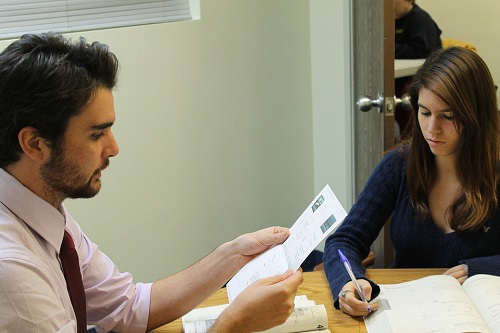After years as an articulate adult, regressing to the eloquence of an excited toddler can be frustrating and quietly humiliating. But it’s also worth it. There is a reason why many of the world’s greatest thinkers have worked in German. Soon you’ll be able to express the fear that time is running out (Torschlusspanik) or describe a face that just begs to be slapped (Backpfeifengesicht) in one elegant word. But it isn’t just for building incredible nouns and speaking with keen precision that German is important, it is also crucial for becoming a part of German life and culture.It’s true that in Germany many people, especially in big cities, can speak good English. But living life detached from your surroundings takes its toll. Things like going to the doctor, talking to the postman, or engaging with people on the street, can be anxiety-inducing encounters when you don’t speak the language. Learning German at least to a conversational level is not only useful, but can be can intensely rewarding, and will undoubtedly improve your quality of life in Germany.
There are a number of different ways to go about learning German, but don’t be mistaken: simply living in Germany will not suffice. In monolingual Anglo-saxon homes, people are often under the impression that learning a language is mostly just a process of absorption. Sadly, it’s not. Unless you’re willing to speak and hear nothing but German at home, work, and in your social life for a number of years, then you’re probably going to have to find a more reliable route.
Weighing your options
Begin with a bit of self-reflection and consider how you learn best:
• Do you prefer to learn in a group or alone?
• Do you prefer a formal learning style or casual?
• How many hours per week are you prepared to devote to German?
• Are you a good self-learner or do you need a push?
Location, location, location
Naturally, where you decide to settle will have an impact on your German. For instance, if you’re living in a big city you will probably have more daily interactions as well as more language-learning options available to you. The problem with big cities though is that they are very international. While this is great on many other fronts, it invariably leads most expats to form relationships with other expats. Likewise, most people in big cities are used to conversing in different languages and you’ll find that a lot of German people will immediately switch to English. This is a bittersweet phenomenon, because while it makes your immediate future much easier, it makes long-term language learning nearly impossible.
German for work
Most expats work in companies that primarily use English as the office language. Many big German firms do this as it vastly increases international opportunities. Even if your company operates in English, it is still a good idea to learn some German for your life outside of work. Some companies will actually offer German lessons for their employees, which is a great way to learn in a familiar environment.

For expats searching for work in Germany, it is definitely important to learn German. While it is possible to find work in English, there are many jobs that will only be available to those speaking German. Moreover, jumping through the hoops in order to find work will require an understanding of the language. For instance, calling offices and speaking to secretaries, or visiting Germany’s many administration offices. (In virtually every administration office, or ‘amt’, be it the foreign office or the employment office, finding someone willing and able to speak English is a near impossible task).
Self-learning
The path of least embarrassment, self-learning can look like an attractive option for many expats. There are numerous apps and online learning platforms available, many of which are free to use. Some of the most popular apps include Duolingo, Babbel, and Busuu, while online platforms include Rosetta Stone and BBC Languages, just to name a few.
Many of these platforms are very helpful tools for learning German. They are especially useful in the initial stages of learning the language, as getting comfortable with a basic vocabulary is the first step before turning to grammar.
The downside of self-learning, however, is that often scheduled ‘language learning time’ can get pushed to the bottom of the priority list, left perpetually as a task for tomorrow.
The other downside is that while these tools are great for building vocabulary, they are less successful at communicating grammar structures. And German grammar is the definitely the most mind-bogglingly high hurdle on the road to speaking.
Self-learning tools and methods can be very helpful but they are best suited to additional study rather than the primary mode of learning.
Private lessons
For many expats in Germany, private lessons will be their ticket to learning German. That is because private lessons solve both embarrassment and motivation problems. That is, you can learn in a relaxed one-on-one environment where you won’t feel silly when you make mistakes, but where you will be committed to learning a certain amount of German every week.
In private lessons, it basically all comes down to the teacher. Finding the best teacher for your learning style is imperative. For instance, are they flexible with times? Do they have an informal or formal approach? Which do you prefer?

It is also crucial to make sure that you and your teacher “verstehen einander,” which translates to “understand each other.” While this is literally important, it is the metaphorical meaning of the term which is pertinent here. In German, when two people “verstehen einander” it means that they get along and are capable of having a good relationship.
The key to German is to make learning enjoyable. Finding a teacher you like and who will teach in the ways you best learn is the most important thing. While nothing will soothe the inevitable moments of frustration and confusion, this will be crucial for maintaining enthusiasm.
One of the best ways to find a private teacher is to first ask around: see if any other expats in your area had a good experience they would recommend. Otherwise, there is no end to ads for private tutors online. A good place to start looking is Cafe Lingo. Most private lesson tutors will not require you to commit to any set number of hours, so there is not harm trying a few out before you decide who you like best.
Language schools
The majority of expats land in Germany without speaking a word of German, so there no need for your cluelessness to feel out of place. In Germany you’ll find a number of different language schools to choose from in most cities. Language schools can also be a very effective way to learn German as they require regular attendance and, of course, there is someone there to answer the myriad of questions you’re likely to have. In Germany, the most affordable language courses are offered by Volkshochschule. These are public learning institutions that offer a wide selection of courses. But be warned: because they are cheap, they often have very large class sizes.
The more moderate option would be to choose a private language school. Often, more expensive schools will guarantee smaller class sizes. For instance, there are some language schools that will cap class sizes at 4-5 students. Most reputable schools will allow you to sit in on one lesson for free to experience how the school operates. I would highly recommend this as some schools, learning styles, teachers, and groups of students will suit more than others.
Most private language schools will also allow students to study either full or part-time. Part-time courses will often happen one or two times per week, and are usually designed to fit around a working schedule.
Certifying your German
Unlike the other German learning methods, the Goethe Institute offers its students a recognised language certification. That is, if you take courses at the Goethe Institute you will be able to use your language certificate as recognised proof of your German proficiency, which may be useful if you’re applying for universities or other positions that require language certifications. However, the Goethe Institute is by no means the only way to get a recognised language certificate, and it is definitely the most expensive. The alternative is to study elsewhere and take an external exam, such as the TestDaF or Telc test, in order to obtain German certification.
Other helpful tips
Get a tandem partner: meeting Germans can be hard, especially when you’re nervous about practising a language you’re not yet fluent in. Getting a tandem partner can help as it allows you to practice speaking with someone whose mother tongue is German. You can search for tandem partners through Cafe Lingo or Sprachduo. Be careful to find someone whose English is on par with your German, or else you might end up primarily speaking English.
Some cities also host group tandem events in cafés or bars. Aside from being a means to improve your German, they can also be a good way to meet people in your area. Look on Meetup or Facebook to find out what’s going on near you.
Listen to the radio: At first it will be impossible to understand anything aside from 80s hits. But the main reason for this exercise is to get used to how quickly real Germans speak. Eventually you’ll find yourself comprehending words and before long whole segments.
Speak: It’s embarrassing at first, but it’s something that has to be done. Luckily, most Germans are very patient and forgiving when it comes to foreigners massacring their language. Mistakes are inevitable but in the scheme of things they don’t matter. Just do it.
Have you learned German? Share your tips in the comments below!

